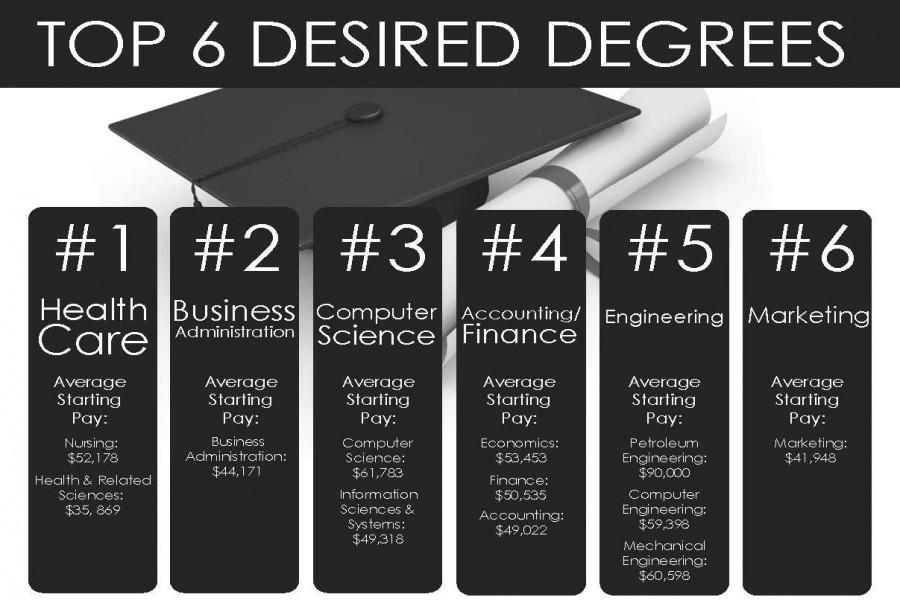Though everyone looks the same on graduation day, the possibilities for degree-holding students vary with employment.
According to Yahoo! Education, the corporate consulting firm Challenger, Gray & Christmas polled 100 human resource professionals in 2010 to find out which degrees rank highest in terms of employment.
Health care degrees were ranked first on the list with nursing, physical therapy, pharmacy and medical technician as some of the most secure positions no matter the current economic condition in the country.
Nursing was the most sought after of health care degrees with an average starting pay of $52,178 according to the National Association of Colleges and Employers’ 2011 Salary Survey, which looked at starting salary offers for new Class of 2011 college graduates.
A degree in business administration was second on the list with positions in business and business administration. Business Administration led the field with $44,171 in average starting salary.
Computer science was ranked third and with computer science degrees receiving an average starting pay of $61,783 and information sciences and systems at $49,318.
Accounting and finance degrees came in fourth. Economics degrees receive an average starting pay of $53,453, finance with $50,535 and accounting with $49,022.
Engineering degrees ranked fifth and according to a survey by the National Association of Colleges and Employers, eight of the top 10 best-paid majors are in various engineering fields with petroleum engineering receiving the highest at $90,000.
Marketing ranked sixth with an average starting pay of $41,948.
Of these majors, Nicholls students can complete a degree in nursing, health sciences, business administration, computer information systems, accounting, finance and marketing.
There is a completely separate list of degrees that earn the highest salary, so although the before mentioned degrees may be easily employed, those will not necessarily earn the highest pay.
According to Forbes, engineering concentrations comprise one third of the most valuable majors and the STEM subjects of science, technology, engineering, and math are the most well-paid. Students can justify going to a more expensive school because the future job will have a better salary.
A survey from the National Association of Colleges and Employers shows that engineering majors dominate the list of college degrees that pay the highest salaries for recent college graduates. To identify the most profitable majors, NACE uses starting salaries from more than 400,000 U.S. employers and measures the average starting salary for employed members of the 2012 graduating class.
Engineering is the highest paid across the board with some concentrations earning a base salary up to $100,000. Petroleum engineering is highly sought after, especially in Louisiana as the experts in geology, drilling and other fields to help companies effectively collect and use oil and gas resources. Chemical and electrical engineering recent graduates earn base salaries approximately $61,000, which grows to more than $100,000 during the career.
Engineering concentrations continue with majors like aerospace engineering, computer engineering and computer science. Biomedical engineering is another concentration that may earn a starting salary of $53,800, which grows an average of 82% to $97,800
Mathematics, finance and economics are next in pay. Applied mathematics is first in the list, with recent graduates earning more $50,000 growing to $100,000 later in the career. Statistics also has a starting salary of $50,000 for recent graduates and a mid-career salary of approximately $90,000. Finance follows with recent graduates earning a starting salary of $46,000 and almost $90,000 later in the career.
Nicholls degree programs like biology, chemistry, and applied sciences like petroleum services and geomatics can also be used to pursue further education in these fields.
Balaji Ramachandran, department head of applied sciences, said students can participate in a transitional two-year pre-engineering program to take the general education classes for their discipline with the guidance of the applied science instructors.
“For example, if a student wants to go into chemical engineering and they tell us ahead of time, we map out the courses for them,” Ramachandran said. “In addition to that, we have geomatics as a four-year degree and petroleum services and safety technology, which is engineering-related but not totally engineering.”
Students can use these degrees as a starting program for many of the engineering concentrations listed.
“Some of the geomatics students are surveyors and mappers and they continue on to get an engineering degree and sometimes petroleum services majors start off in the program because they are already working in the oil field and they want to further their career,” Ramachandran said. “Then some of the students continue on to receive their engineering degree or master’s degree elsewhere. We make sure they get the right level of math, physics and chemistry so that when they continue on they have what they need.”
Ramachandran said that students go through specific advising to ensure they are enrolled in the most beneficial courses, but not all students use the advantages of the program.
“One time a student came in who never met with us, and he chose to take easy courses for his general education classes,” Ramachandran said. “When he switched to his engineering discipline, most of the courses didn’t carry over because he took the easy path and he had to redo his coursework. We try to prepare everyone as much as we can.”
Most employed degrees differ from most paid
Kami Ellender
•
March 21, 2013
0
More to Discover








